125 British MPs Sign Letter Supporting Iranian Activist's Hunger Strike
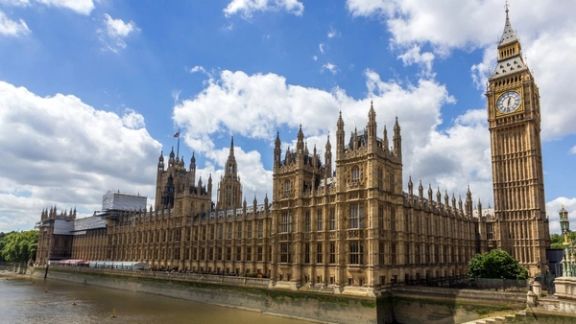
A group of 125 British MPs has signed a letter backing hunger striker Vahid Beheshti’s call for the Islamic Revolutionary Guard Corps (IRGC) to be outlawed.

A group of 125 British MPs has signed a letter backing hunger striker Vahid Beheshti’s call for the Islamic Revolutionary Guard Corps (IRGC) to be outlawed.
The group supported the Iranian activist's call for the IRGC to be declared a terrorist organization in a letter they signed and sent to Prime Minister Rishi Sunak.
A group of the MPs backing Beheshti visited him in London on Wednesday as his hunger strike outside the Foreign Office entered its 56th day.
This comes as a series of protests are planned across London this month in support of Beheshti.
“Vahid has shown remarkable dignity and strength throughout his protest and has widespread support from parliamentarians who share his sense of urgency in the need to proscribe the (IRGC) as a terror organization,” read the letter addressed to Prime Minister Rishi Sunak, Foreign Secretary James Cleverly, and Home Secretary Suella Braverman.
“Proscription of the IRGC has deep support across Parliament. MPs unanimously endorsed a motion earlier this year calling for proscription. Peers from all parties and none have also joined the efforts to end the IRGC’s ability to operate in the UK.”
The government's decision to proscribe Hamas and Hezbollah terror groups was also noted by the group as an important step in combating extremism and terrorism, but the UK cannot afford to stop there.
“The IRGC is, after all, the primary financier, supplier, and trainer of these dangerous groups. It is incumbent upon the Government to go after the parent organization,” added the letter.

Iran and China are becoming increasingly brazen in their attempts to silence dissidents on American soil and influence US policy, the FBI warned Wednesday.
In a news briefing with reporters about transnational repression, FBI counterintelligence officials urged victims to come forward, saying the bureau is tracking a growing trend of foreign authoritarian regimes breaching US laws to intimidate certain communities.
The officials said the governments have at times resorted to using private investigators to conduct surveillance on dissidents and that several criminal cases have been brought by federal prosecutors involving their use.
The most brazen case of attempts to silence Iranian dissidents were two plots uncovered by US law enforcement against the prominent Iranian dissident and activist Masih Alinejad living in New York City in 2021 and 2022.
The Justice department announced in July 2021 that the FBI had foiled an attempt by Iranian intelligence to kidnap her, although it did not identify her by name. Later, Alinejad told the media that she was the person targeted.
Earlier this month, a federal court in New York sentenced Niloufar Bahadorifar, an Iranian-American woman, who had pleaded guilty in the plot to kidnap Alinejad.
The plan reportedly involved kidnapping her and taking her to Venezuela by speed boat, apparently to be sent back to Iran and executed like other kidnapped dissidents.
"A lot of these are new tactics and lines that are being crossed that we have not seen China and Iran do on US soil in previous investigations," one FBI counterintelligence official said. He added that the FBI hoped to raise awareness of such trends and alert the private investigator sector and state and local law enforcement.
Iranian intelligence extensively operates also in Europe, where serious threats against journalists detected by British police last November led to the temporary closure of Iran International’s London broadcasting center and moving operations to Washington DC.
Officials said the goals of transnational repression schemes are multifaceted, and at times also aim to influence US policy decisions through "malign influence tactics."
"We've really seen an inflection point in the tactics and tools, and the level of risk and the level of threat that have changed over the past few years," another FBI counterintelligence official said.
The call with reporters on Wednesday came just two days after federal agents arrested two New York residents for allegedly operating a Chinese "secret police station" in Manhattan's Chinatown district, in what prosecutors said is part of a broader US government crackdown on Beijing's alleged targeting of dissidents.
Safeguard Defenders, a Europe-based human rights organization, has published reports in recent months revealing the presence of dozens of Chinese police "service stations" in major cities around the world, including in New York and Los Angeles.
FBI officials declined to comment on the New York case or speak about any other open investigations.
Reporting by Reuters
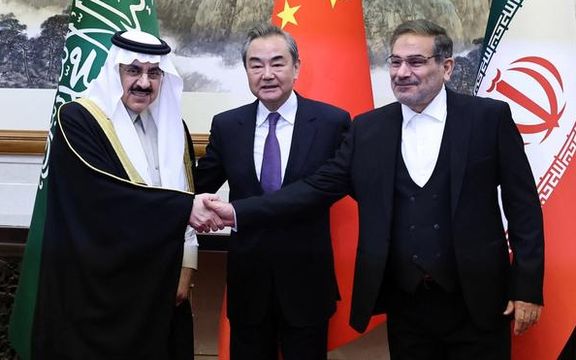
Iranian media commentators are still discussing the implications of the Iran-Saudi restoration of relations on Iran’s foreign and even domestic policies.
Middle east expert Ghasem Mohebali told moderate conservative news website Khabar Online on April 18 that the agreement does not mean disputes between Tehran and Riyadh have been settled. The effectiveness of the agreement will be tested only after the two countries' embassies reopen in May after seven years.
In the meantime, Iran's President Ebrahim Raisi has welcomed an invitation to visit Riyadh and has on his part invited King Salman to visit Iran, which is yet another sign to indicate willingness of both sides for détente.
Mohebali says the Tehran-Riyadh agreement only shows that relations are back on track for normalization. The two sides, he said, have many differences. The conflict in Yemen is only one of them. The two countries also have their differences over Iraq, Syria, Lebanon and the Persian Gulf, and, of course, Iran's nuclear program. They also need to discuss their regional rivalries in a way to prevent further tensions in the future.
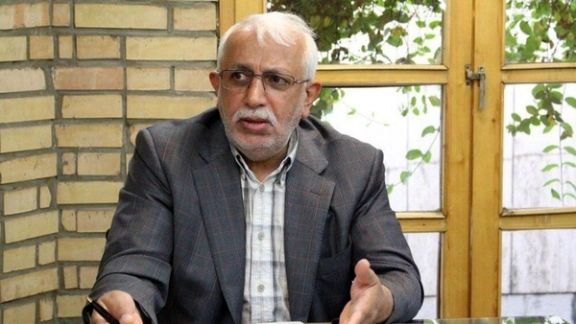
Both Iran and Saudi Arabia can help establish a stable government in Yemen, the Iranian analyst said. As regards Syria, Saudi Arabia needs to bring back Damascus to the Arab League. The impact of this return on the region is also important. And then we need to see what happens to foreign forces in Syria.
Mohebali said the issue of Bahrain is also one of the main challenges facing Iran and Saudi Arabia, with the latter concerned about Iran's influence over Shias in the small kingdom and its interference in that country. Bahrain is next door to Saudi Arabia and developments there affect its security.
However, the two countries have also some shared interests in the areas of oil, energy and security. These can be the topics of the next round of talks between Tehran and Riyadh.
Mohebali added that the revival of ties will also impact regional countries' attempts to settle the post-Arab Spring problems. For all of those countries security is the most important issue. The region's security is also equally important for the United States, Europe and China.
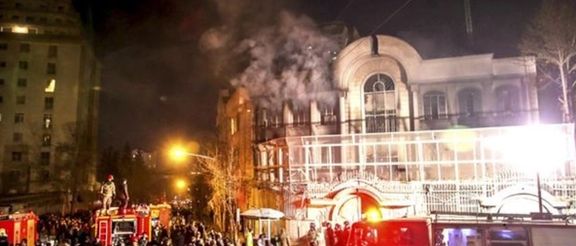
Meanwhile, according to a report published on the moderate Entekhab news website, many questions have been raised about the impact of the Iran-Saudi deal on Iran's foreign policy. How it will affect Iran's other international dossiers including the revival of the 2015 nuclear deal, the JCPOA. The rapprochement can affect Iran’s key foreign policy issues in two different ways, the report said.
The first possibility is rationality extending to other matters in the regime's decision-making system, and leading to major steps toward settling the nuclear issue, negotiations with the United States, and even reaching détente. This is a desirable scenario that could put Tehran back on the right track and even lead to an improvement in governance and restoring the broken ties between the regime and the people.
This is possible only if the regime follows a realistic approach based on national interests. It will mark a serious change in Iran's approach to domestic and international issues.
The other scenario, which is probably more likely within the Iranian government is to interpret the ties with Saudi Arabia within an unrealistic framework. The advocates of this scenario will interpret the restoration of ties based on their own ideological points of reference, and as they have done so far, reiterate that Iran has imposed its will on Saudi Arabia and see the whole dynamics as Riyadh's alliance with Tehran against the United States. They might even think that Iran no longer needs to return to the JCPOA. According to Entekhab, this would be yet another miscalculation by the Iranian regime.
In other words, while Saudi Arabia uses the rapprochement with Iran as part of its strategy of moving toward sustainable development in the digital age by reducing unnecessary regional tensions, Tehran might mistake the restoration of ties with Riyadh for an ideological alliance.
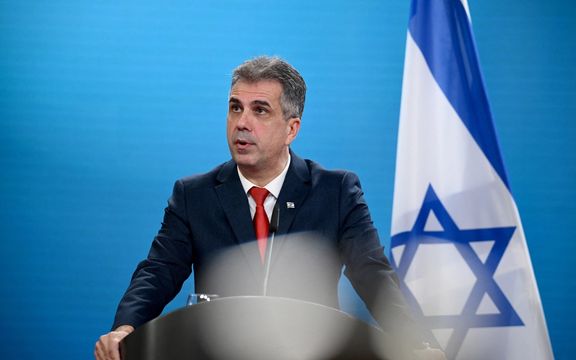
Amid simmering tensions between the Islamic Republic and Israel, Jerusalem has moved to consolidate relations with Iran’s neighbors Turkmenistan and Azerbaijan.
Following the opening of Azerbaijan’s embassy in Israel in March, Israeli Foreign Minister Eli Cohen met in Baku with President Ilham Aliyev on Wednesday and discussed common strategic challenges. They also discussed regional security and the fight against terrorism, as well as expanded cooperation.
“Azerbaijan is a Muslim country, and its strategic location makes the relationship between us of great importance and great potential. Israel and Azerbaijan share the same perception of the Iranian threat. The Iranian ayatollah regime threatens both our regions, finances terrorism and destabilizes the entire Middle East. We must act together to prevent Iran from achieving nuclear capabilities,” Cohen said.
Heading a delegation of 30 Israeli companies at the Presidential Palace, Cohen said, “Israel and Azerbaijan are strengthening their political and security alliance. I met with the President of Azerbaijan, Ilham Aliyev, and we talked about the strategic regional challenges we share, chief among them regional security and the fight against terrorism.
“I congratulated the president on his decision to establish an embassy in Israel, the first embassy of a Shiite Muslim nation in the country,” Cohen said, adding that the step further strengthened security, as well as the political and economic alliance between the two countries.
Cohen added, "We signed a series of agreements between us and Azerbaijan that will significantly increase the economic potential between the countries.”
When Azerbaijan opened its embassy in Israel in March, Cohen hosted his Azeri counterpart, Jeyhun Bayramov. At the time, the embassy opening was the first since Israel and Azerbaijan established relations in 1991.
Israel is one of Azerbaijan’s leading arms suppliers. According to
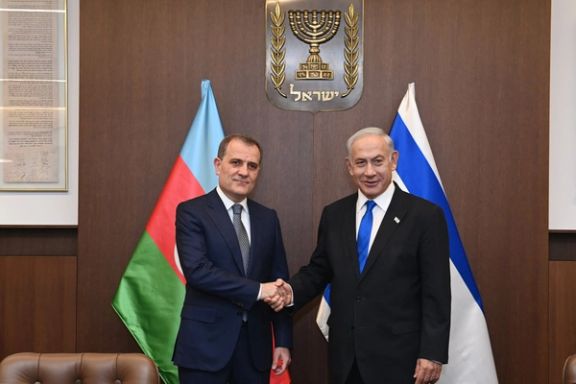
the Stockholm International Peace Research Institute, Israel provided 69 percent of Baku’s major arms imports in 2016-2020, accounting for 17% of Jerusalem’s arms exports over that period.
Cohen flew from Azerbaijan to Turkmenistan Wednesday night, becoming the first Israeli minister to visit the central Asian state in nearly three decades.
Cohen will inaugurate Israel’s embassy in the Turkmen capital Ashgabat, a mere 15 miles from Iran’s northeast border. The office will be Israel’s closest embassy to its archfoe Iran. The move is apparently intended to send a message to Tehran that Israel is a present and growing influence in the region.
Turkmenistan, another Muslim-majority country, established relations with Israel after its declaration of independence in 1991. About a decade ago, Israel opened a temporary embassy there with a temporary structure that has become permanent.
"The inauguration of the embassy building is another sign of the strengthening of relations between Israel and Turkmenistan and marks the thirty years of the establishment of relations between countries," Cohen said.

An Iranian activist who has been on hunger strike since February has called for a rally urging the UK to brand the IRGC as terrorists.
Vahid Beheshti has urged followers to join the protest in London on April 29.
That date will be the 65th day of his hunger strike, which began on February 23. Beheshti has been outside the UK Foreign Office since then calling for the British government to designate the IRGC a terrorist organization.
He said the 65 days will equal the hunger strike of Bobby Sands, a member of the Provisional Irish Republican Army, before his death in 1981.
Beheshti hopes that Iranians turn out for the London rally in similarly large numbers to those for the epic protest in Berlin on October 22, 2022.
Beheshti has been battling the bitter winter outside the UK Foreign Office to raise awareness for the need to proscribe the IRGC which is responsible for the deaths of hundreds of Iranian citizens since September. Prime Minister Rishi Sunak and his cabinet have not yet reacted to his hunger strike.
On Wednesday, April 19, Beheshti entered the 55th day of his hunger strike while he is forced to sit on a wheelchair due to his physical weakness.
Political figures, human rights activists and artists have visited Beheshti while he maintains his vigil and paid tribute to his resistance, but also urged him to end his hunger strike.
A number of other Iranians have also joined his protest action in the past weeks and have set up their tents for a sit-in in front of the UK Foreign Office building.
In an interview with Iran International, Beheshti called his hunger strike a protest action, but not one intended to harm himself.

Hackers linked to Iran are targeting critical US infrastructure including transport, energy and ports, Microsoft has warned.
A report released on Tuesday by Microsoft Threat Intelligence revealed the threat from the Iranian hackers, known as "Mint Sandstorm".
The gang’s recently adopted new strategy is to target energy and transportation infrastructure across the US, including ports, energy companies, and transit systems.
Initially engaged in reconnaissance, the subgroup eventually began attacking critical infrastructure organizations in the United States in 2022.
These attacks were "potentially designed to support destructive cyberattacks in retaliation," Microsoft said.
"Mint Sandstorm" is a new name used by Microsoft to track the activities of hackers formerly known as Phosphorus, a collection of threat actors deemed to be affiliated with the Iranian Revolutionary Guard Corps (IRGC) intelligence arm.
Mint Sandstorm has also been referred to as APT35, APT42, Charming Kitten, and TA453. However, Iran has denied carrying out cyberattacks.
Since at least 2011, Mint Sandstorm has targeted activists, journalists, critical infrastructure, and government entities.
Microsoft researchers reported in February that an Iranian regime-backed hacking team had stolen and leaked the French satirical magazine Charlie Hebdo's data.
The hackers, calling themselves “Holy Souls,” were from the Iranian cybersecurity firm Emennet Pasargad, according to Clint Watts, General Manager of Microsoft's Digital Threat Analysis Center.
In November 2021, the United States Justice Department indicted two Iranians, Mohammad Hosein Musa Kazemi and Sajjad Kashian, who were employed by Emennet Pasargad.
During the 2020 presidential election, they allegedly conducted a cyber campaign "to intimidate and influence American voters" as well as undermine voter confidence and sow discord.